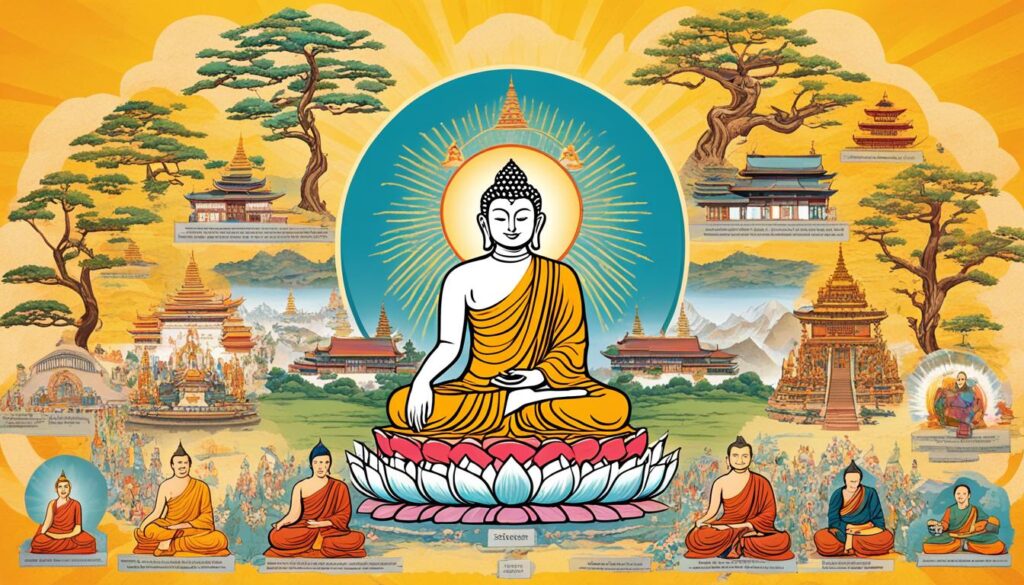“The mind is everything. What you think you become.” – Buddha
Embark on a journey to uncover the profound wisdom of Buddhism and discover the path to enlightenment and inner peace. Rooted in the teachings of Siddhartha Gautama, Buddhism offers profound insights into the nature of existence and provides practical tools for navigating the challenges of life.
Buddhism encompasses a rich tapestry of beliefs and practices that explore the nature of suffering, the pursuit of enlightenment, and the cultivation of mindfulness and compassion. By delving into the core aspects of Buddhism, you open yourself to a transformative spiritual path that can bring harmony and alleviate suffering in your life.
Key Takeaways:
- Learn about the Four Noble Truths and how they provide a roadmap to end suffering.
- Understand the concept of karma and how it shapes our present and future experiences.
- Discover the different schools of Buddhism and their unique practices and beliefs.
- Explore the role of meditation and mindfulness in cultivating inner peace and clarity.
- Embrace the transformative power of compassion and its impact on personal and societal well-being.
The Four Noble Truths
The Four Noble Truths are the essence of Buddha’s teachings. They form the foundation of Buddhism philosophy and provide guidance for Buddhist practices. Let’s explore these core tenets of Buddhism and their significance in the pursuit of enlightenment.
The First Noble Truth: Suffering
In Buddhism, suffering is not seen as something to be avoided or ignored but rather acknowledged as an integral part of life. It is a pragmatic perspective that recognizes the impermanence of pleasure and the inevitable realities of aging, sickness, and death. By understanding the nature of suffering, one can develop a deeper sense of empathy and compassion towards oneself and others.
The Second Noble Truth: Cause of Suffering
According to Buddhism, the root cause of suffering is desire and ignorance. Attachment to worldly desires and the illusion of a permanent self lead to unsatisfactoriness. Ignorance refers to the lack of understanding of the true nature of reality. By recognizing and addressing these inner afflictions, one can begin to alleviate suffering and cultivate a sense of inner peace.
The Third Noble Truth: Cessation of Suffering
The third noble truth offers hope by proclaiming that suffering can come to an end. By letting go of attachment, craving, and aversion, individuals can attain liberation from suffering. This cessation of suffering is not merely a temporary relief but a profound and lasting state of inner peace and enlightenment.
The Fourth Noble Truth: The Path to End Suffering
The fourth noble truth presents the Noble Eightfold Path as the way to end suffering and attain enlightenment. The Noble Eightfold Path encompasses eight interconnected practices that guide individuals towards a balanced and harmonious life. These practices include Right Understanding, Right Thought, Right Speech, Right Action, Right Livelihood, Right Effort, Right Mindfulness, and Right Concentration.

By following the Four Noble Truths and walking the Noble Eightfold Path, individuals can deepen their understanding of Buddhism philosophy and embark on the journey towards enlightenment. The Four Noble Truths offer valuable insights into the nature of suffering, its causes, its end, and the path to liberation.
Karma and Rebirth
One of the fundamental principles of Buddhism is the concept of karma, which seeks to explain the consequences of our actions. In Buddhism, karma refers to the principle that our deeds, both good and bad, have consequences that determine our future experiences.
According to Buddhist teachings, good actions lead to happiness and peace, while bad actions lead to suffering and unhappiness. This understanding of karma encourages individuals to be mindful of their actions and to cultivate positive intentions in order to create a more harmonious world.
Central to the idea of karma is the belief in the cycle of rebirth, or samsara. Rebirth is based on the accumulated karma of an individual and entails the continuation of their consciousness in a new form after death.
There are six realms into which a being can be reborn: the realms of gods, demigods, humans, animals, hungry ghosts, and hell beings. Each realm offers different experiences and levels of suffering or happiness.
The realm of humans is seen as particularly significant in Buddhism because it provides individuals with the opportunity to achieve enlightenment and liberation from the cycle of rebirth. It is in this realm that individuals have the potential to transcend suffering and attain nirvana.
Reincarnation, the process of being reborn into different forms, is viewed as a reflection of the impermanent nature of existence. It reminds us that life is constantly changing, and that our actions in the present have far-reaching consequences for our future well-being and spiritual progress.
The Importance of Meditation
Meditation is a key practice in Buddhism that enables individuals to cultivate mindfulness and awareness of their thoughts, emotions, and actions. It is through meditation that practitioners can develop insight into the true nature of reality and experience inner peace.
Meditation involves training the mind to focus and concentrate, often by focusing on the breath or repeating a mantra. Through sustained practice, individuals can learn to remain centered and detached from the fluctuations of the mind, leading to a greater sense of mental clarity and tranquility.
By engaging in regular meditation, individuals can deepen their understanding of the impermanent nature of existence and cultivate compassion towards themselves and others. It is through the practice of meditation that one can begin to break free from the cycle of suffering and attain liberation.

| Key Concepts | Description |
|---|---|
| Karma | The principle that our actions have consequences that shape our future experiences. |
| Rebirth | The cycle of rebirth based on accumulated karma, offering the opportunity for spiritual progress. |
| Realm of Humans | A realm in which individuals have the potential to achieve enlightenment and escape the cycle of rebirth. |
| Meditation | A practice that cultivates mindfulness, awareness, and inner peace. |
Schools of Buddhism
Buddhism is a rich and diverse spiritual tradition that has evolved over centuries. It encompasses various schools or branches, each with its own unique practices and beliefs. Understanding the history and beliefs of these schools can provide valuable insights into the depth and breadth of Buddhism.
Mahayana Buddhism
Mahayana Buddhism is one of the major schools and is particularly prevalent in East Asian countries such as China, Japan, and Korea. One of the distinguishing features of Mahayana Buddhism is its emphasis on compassion and the ideal of the bodhisattva – an enlightened being who chooses to delay their own enlightenment to help liberate others from suffering. This school sees the path to enlightenment as inclusive, with the goal of guiding all sentient beings to liberation.
Theravada Buddhism
Theravada Buddhism, also known as Southern Buddhism, is the dominant form of Buddhism in Southeast Asia, including countries like Thailand, Burma (Myanmar), Cambodia, and Sri Lanka. Theravada practitioners prioritize the teachings of the Pali Canon, the oldest written record of the Buddha’s teachings. Monasticism and meditation play a central role in this school, with the aim of attaining personal liberation and spiritual enlightenment.
Vajrayana Buddhism
Vajrayana Buddhism, commonly associated with Tibetan Buddhism, is characterized by its esoteric teachings, ritual practices, and the use of specific techniques, known as tantra, for achieving enlightenment. This school places great emphasis on the guru (spiritual teacher) and the transmission of teachings through a lineage. Vajrayana Buddhism offers a more expedient path to enlightenment, with the belief that liberation can be achieved within a single lifetime.

Conclusion
Buddhism offers profound teachings and practices that can guide individuals on a transformative journey towards enlightenment and inner peace. By delving into the nature of suffering, embracing the principles of the Noble Eightfold Path, and cultivating mindfulness and compassion, you can discover a path to harmony and alleviate suffering in your life.
At the core of Buddhism lies a deep sense of personal responsibility and the pursuit of enlightenment. Rather than relying on external forces or deities, Buddhism encourages individuals to take charge of their own spiritual growth. Through self-reflection and the application of Buddhist teachings, you can awaken your inner potential and shape your own destiny.
Embracing Buddhism means embarking on an empowering spiritual journey that encourages self-discovery and the ability to cultivate positive change. It teaches us that true happiness and fulfillment lie in transcending our own desires and attachments, and in embodying compassion and wisdom in our daily lives. By integrating Buddhist practices into your routine, you can experience profound shifts in your mindset and find a deeper connection with yourself, others, and the world around you.
FAQ
What are the core aspects of Buddhism?
The core aspects of Buddhism include its beliefs, teachings, and practices that guide individuals towards enlightenment and inner peace.
What are the Four Noble Truths in Buddhism?
The Four Noble Truths are the essence of Buddha’s teachings. They address suffering, its cause, its end, and the path to end it.
How does Buddhism explain karma and rebirth?
Buddhism teaches that one’s actions have consequences, known as karma. Good actions lead to happiness, while bad actions lead to unhappiness. The cycle of rebirth is based on one’s accumulated karma.
What are the different schools of Buddhism?
Buddhism has three main schools: Mahayana, Theravada, and Vajrayana. Each school has its own unique practices and beliefs.
How can Buddhism guide individuals towards enlightenment?
By understanding the nature of suffering, following the Noble Eightfold Path, and cultivating mindfulness and compassion, individuals can find harmony and alleviate suffering in their lives.

